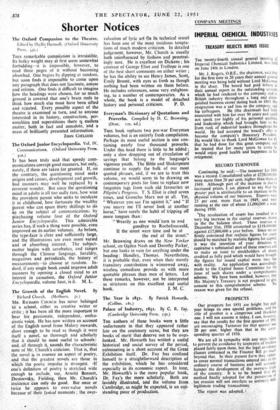The Growth of the English Novel. By Richard Church. (Methuen.
p.)
MR. RICHARD CHURCH has never belonged to a school, either as creative writer or critic ; it has been all the more important to hear his passionate, independent, enthu- siastic voice. He has now written an account of the English novel from Malory onwards, short enough to be read as though it were itself a novel, so thorough and scholarly that it should be most useful to schools: and, all through it, sounds the characteristic note of Mr. Church's criticism. That is, that the novel is in essence an aspect of poetry, and that the greatest novels are those in which the poetic impulse is strongest. 'If one's definition of poetry is stretched wide enough to include. say, Arnold Bennett, Dostoevsky, Fielding, then Mr. Church's insistence can only do good. But once or twice he appears to over-value novels because of their lyrical moments the over-
valuation of lyric art (in its technical sense) has been one of the most insidious tempta- tions of much modern criticism. In detailed judgement, however, Mr. Church is usually both uninfluenced by fashion and penetrat- ingly sure. He is excellent on Dickens ; his contrast of George Eliot and Trollope is one of the best short comments on either writer ; he has the ability to see Henry James, Scott, Emily Bronte, with eyes as fresh as though nothing had been written on them before. He includes references, some very enlighten- . ing, to a number of contemporaries. As a whole, the book is a model of detached history and personal criticism. P. D.


















































 Previous page
Previous page